‘Majority’ worldwide believe gay people deserve equal treatment
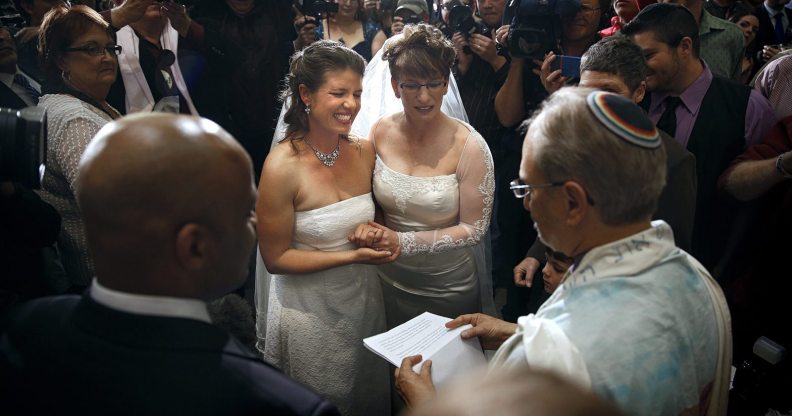
DENVER, CO – MAY 1: Anna (L) and Fran Simon, both of Denver, Colorado, are the first same-sex couple to be issued a Civil Union license at a midnight ceremony in the Denver Office of the Clerk and Recorder, at the Wellington E. Webb Municipal Office Building on May 1, 2013 in Denver, Co. Colorado is the eighth state to have civil unions or similar laws implemented, permitting unmarried couples, both gay and heterosexual, the ability to form civil unions and get similar rights to those of married couples. (Photo by Marc Piscotty/Getty Images)
A majority of people in the world believe that gay people should have equal rights, a large-scale survey has found.
The ILGA-RIWI Global Attitudes Survey reached around 116,000 online individuals in 77 countries across the world, making it the largest-scale piece of research conducted on LGBT issues.
This annual survey was established in 2016 to gather credible data on public attitudes to issues related to sexual orientation, gender identity and expression, and sex characteristics on every continent to assist advocates, researchers and policy-makers in their work.
Taking a global average across all of the countries surveyed, 55% of people agreed that “equal rights and protections should be applied to everyone, including people who are romantically or sexually attracted to people of the same sex”.
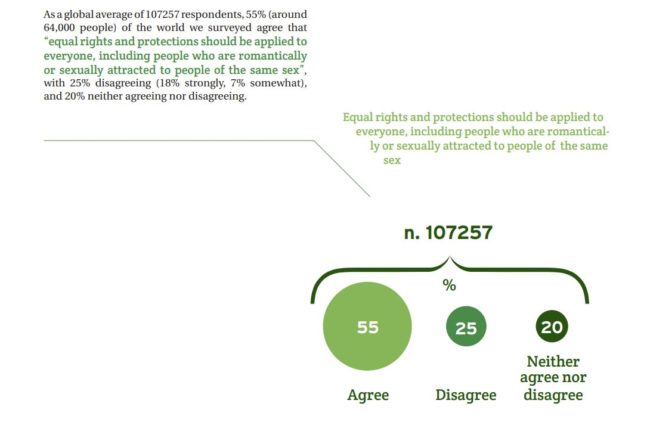
59% of people agreed that people who dress, act or identify as one sex although they were born another should have equal protection under the law.
The poll also found that 41% of people across the world know someone who is attracted to people of the same sex.
Aengus Carroll, co-author of the research, said: “A consistent message from these data is that knowing someone in these communities has significant positive effect on attitudes towards them.
“At the global level, 41% of respondents know someone who is romantically attracted to people of the same sex.
“We interpret what we are seeing in this data as suggesting that when people know each other first-hand, a de-stigmatising effect can be produced, and that counters the stereotyping too often perpetuated by religious and political leaders, as well as in media.”
Unsurprisingly, support for equality rises significantly among people who already know an LGBT person to 73%.
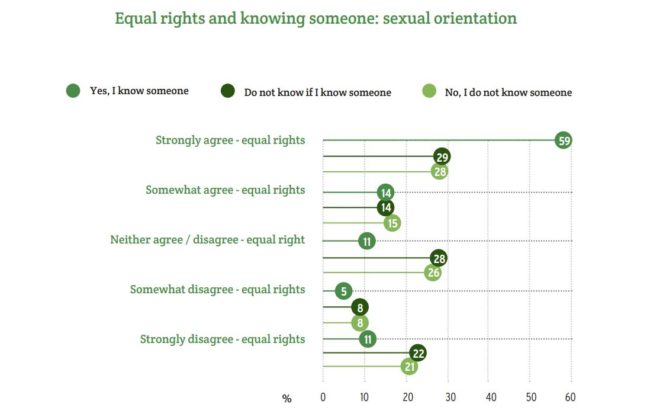
Of the respondents who don’t know someone LGBT, only 44% agree that equal rights and protections should be applied to everyone.
Findings also demonstrate that a majority of people feel they can respect their religion and their culture and be accepting of sexual and gender diversity – evidence that strongly counters the discriminatory, and often dangerous messages, delivered by religious or political leaders
Being accepting of sexual and gender minorities and still respecting one’s religion is a concept that 48% (regarding sexual orientation) and 53% (regarding gender identity and expression) agreed with, and almost identical percentages were recorded when it comes to respecting one’s culture.
More than 3 in 4 respondents among those who feel they can respect their culture and be respecting of diversity also declared positive attitudes towards having a female/male/or gender diverse neighbour.
Ruth Baldacchino and Helen Kennedy, co-Secretaries General of ILGA said: “While many of these data may be read as not as negative as one may have feared, we know that positive attitudes do not automatically translate into full equality.
“On the contrary, we witness everyday how our identities and bodies are still used as convenient scapegoats by leaders who are appealing to ‘traditional values’ and looking for support from more conservative sectors of their society.
“The backlash at national levels to progress made at the United Nations and at regional human rights institutions demonstrate the ideological war that is currently occurring.”
In States that criminalize same-sex sexual activity (25 of the 77 in this survey), attitudes about equal rights and protections, neighbours, socializing, and about criminalization itself are more severe.
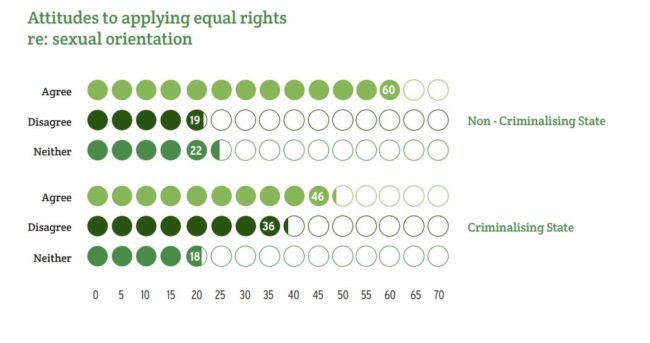
Only 46% of respondents in criminalising States, for example, agree that equal rights and protections should be inclusive of sexual orientation, while in non-criminalising States that figure rises to 60%.
In criminalising States, the average of positive comments regarding neighbours is only 37%, while the average in the non-criminalising States is 68%.
These distinctions are also reflected when it comes to workplace discrimination. Around 62% of respondents in non-criminalizing States agree that work protection should apply to all workers, no matter their romantic or sexual preferences (with 20% disagreeing), while 49% feel the same in the criminalizing States surveyed (with 30% disagreeing).
Similar percentages were recorded when it came to protection from discrimination on the grounds of people’s gender identities.
Renato Sabbadini, Executive Director of ILGA said: “Restrictive laws, in other words, are predictors of restrictive and non-inclusive attitudes.
“This is why this global survey, with its evidence-based and non-anecdotal data, is a powerful tool for the advancement of human rights of people belonging to sexual, gender and sex minorities around the world: it offers significant opportunity to inform the public about actual prevailing attitudes, and thereby assists not only human rights defenders, but also agencies, businesses, employment organisations and governments, as well as regional and international organisations, in the efforts to reduce stigma, violence and discrimination against our communities.
“To those who use ideology to justify discrimination, we respond with evidence and data that can contribute to changing the world and the lived realities of many people worldwide.”
The UN’s independent LGBT human rights expert recently warned of a brewing global crisis amid reports of homophobic purges in several countries.
Human rights monitors in Russia have warned about a homophobic purge in the autonomous Chechnya region, with dozens of gay men reportedly killed by authorities and vigilantes while many others were forced to flee.
More recently authorities in Egypt launched a crackdown on the gay community, sparked by a ‘moral panic’ over the waving of a rainbow flag at a music concert.
Since the concert, Egyptian authorities began a ‘purge’ targeted at the country’s gay community, raiding homes and arresting more than 60 people. The state has also banned local media from mentioning the issue.
Tanzania also this month clamped down on the LGBT community, raiding a summit and arresting legal experts who had had been discussing a proposed legal challenge to an anti-LGBT government policy.
The country has since outlawed the human rights charity behind the summit, accusing it of “promoting homosexuality”.
There has also been a recorded rise in anti-LGBT sentiment in other countries across the world, including Indonesia,
In a landmark address to the United Nations General Assembly in New York, a UN expert on LGBT issues warned about a “crucible” of rights violations
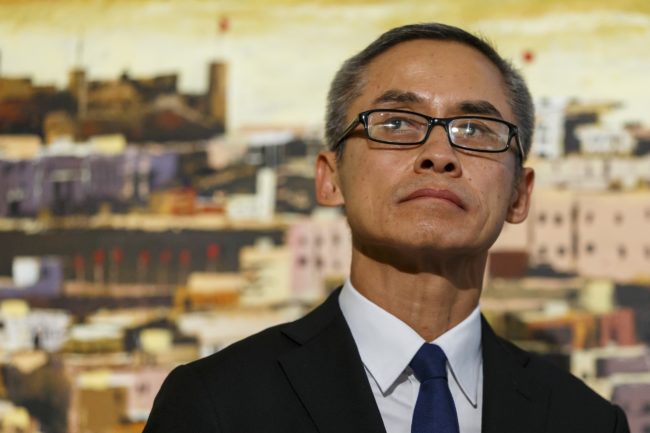
The UN’s first Independent Expert on protection against violence and discrimination based on sexual orientation and gender identity, Vitit Muntarbhorn, made the warning today.
The Thai human rights monitor warned that immediate action is needed to stop a global crisis, as LGBT people around the world suffer horrific violations of their human rights.
Mr Muntarbhorn said: “It is unconscionable that people with an actual or perceived sexual orientation, gender identity and gender expression different from a particular social norm, are targeted for violence and discrimination in many parts of the world.
“LGBT people are suffering a crucible of egregious violations, including killings, rape, mutilation, torture, arbitrary detention, abduction, harassment, physical and mental assaults. They are subjected to lashings and forced surgical interventions, bullying from a young age, incitement to hatred and pressures leading to suicide.
“More than 70 countries around the world today still criminalize same-sex relations, and in some of them the death penalty may be applied.
“Even where there is no law criminalizing consensual same-sex relations, laws on public decency, public order and social peace are used in some countries to incriminate people under the umbrella of sexual orientation, gender identity and related gender expression.”
The human rights expert called for all laws criminalizing same-sex relationships to be removed from the statute books, also calling for an end to anti-LGBT ‘gagging’ laws used for the purpose of consolidating power and suppressing dissent.
He also warned that human rights defenders were being increasingly targeted for their work in the field.
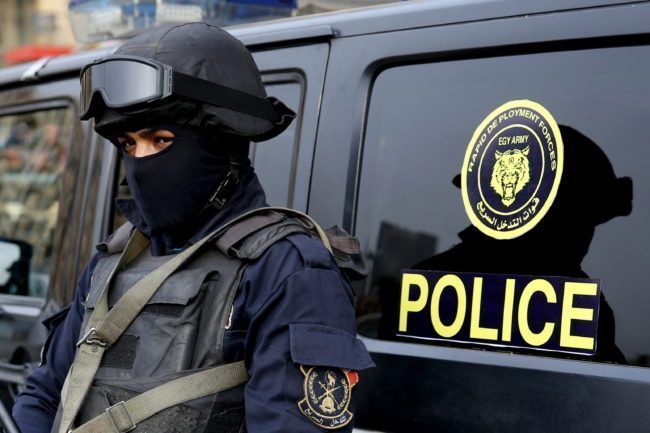
He said: “Non-governmental organizations, human rights defenders and activists, as well as independent national human rights institutions, play a crucial role in the advancement of an inclusive agenda for all without discrimination and distinction, including through the promotion of understanding of and respect for human rights and gender diversity.
“They are agents of change which can activate significant reform processes.”
Mr Muntarbhorn was first appointed to the role last year, as the UN’s first ever independent LGBT rights expert.
He said: “It is anchored in international human rights law, and it is a momentous commitment to multilateralism. It is an invitation to be forward looking and an incentive to move forward together.”
Mr Muntarbhorn said the “universal umbrella of human rights” offered a blueprint for the respect of diversity and appreciation of our common humanity.
However, his report has been met with derision from some countries.

